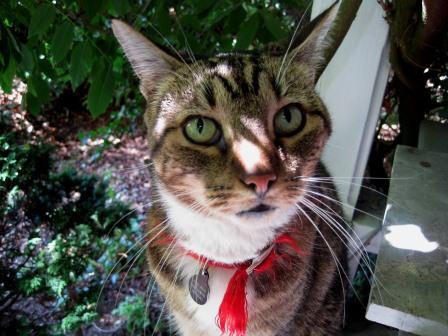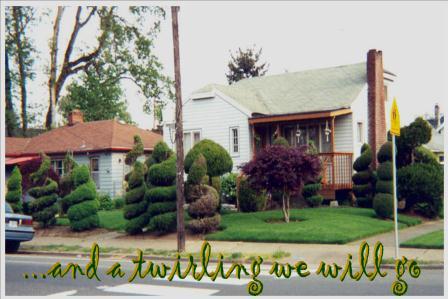This week’s podcast is dedicated to anthocyanins – those pigments that give plants red, blue, and purple colors. Anthocyanins are also powerful antioxidants, important visual signals for pollinators, and often deadly to insect pests. The myth of the week explains why red leaves aren’t usually a sign of phosphorus deficiency, but instead an indicator that anthocyanins can help plants survive many environmental stresses.
My interview this week is with Cass Turnbull, founder of PlantAmnesty, a Seattle organization dedicated to “ending the senseless torture and mutilation of trees and shrubs.” My son Jack took the interview photos, and Cass supplied the others from the PlantAmnesty photo archive. You’ll love the way she combines her educational message with humor!

Cass on her “throne”
 One of the nonbotanical garden residents
One of the nonbotanical garden residents


 A selection of PlantAmnesty humor
A selection of PlantAmnesty humor
Please let me know what you think of the podcast; you can email me directly or post a comment on the blog. Suggestions for future podcasts are most welcome!
Maple trees in Oakland County, Michigan, are suddenly (within the past 4 years) plagued with tar ball fungus — a black spot on the leaves. Officials say it’s nothing to worry about, but we’ve had similar damage to English Ivy (fungus that turns leaves yellow and kills them) and lawns (fungus that kills grass and spreads). Unusually damp spring weather is stressing our local plant life.
I certainly am glad there’s no such thing as global climate change, or I’d be really worried. 😉
Nice job on the podcast. I’ve been a ‘Plant amnesty admirer’ from afar for many years. Great interview with Cass!
Thanks for this interview! Cass Turnbull’s book on managing and renovating landscapes opened my eyes back in the early 90s, and her Guide to Pruning is a standby for me.
Housekeeping topic: I hadn’t gotten a post from The Garden Professors
for several days, and just discovered that somehow my feed link isn’t working. Even when I unsubscribed and resubscribed, the posts that pop up in my Google Reader end at Holly’s post on alliums. Any advice?
Glad you liked it, Bert and Deb! Cass is fantastic, isn’t she?
Deb, on your other issue: some users a month or so ago had problems with feedburner rss feed. That’s when we switched the link off the top page to use the sharepoint rss feed. Are you using the old rss feed? Have you tried the link from rss icon on the top page recently? If so, please send more information on your computer, rss reader and web browser so we can figure this out.
Have her try linking from the top page’s rss feed first.